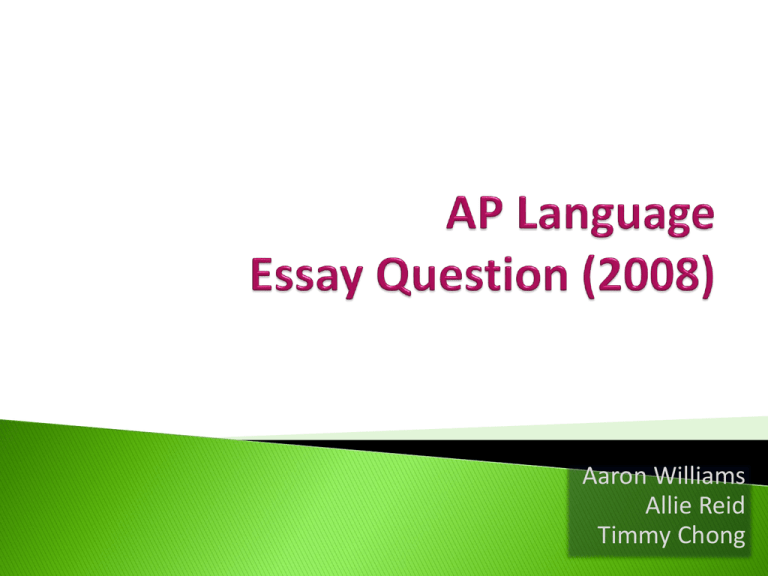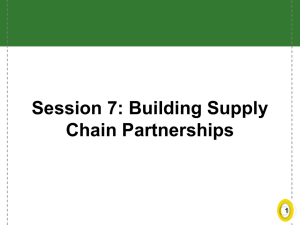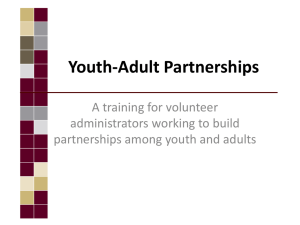APLANG AARONALLIETIMMY
advertisement

Aaron Williams Allie Reid Timmy Chong For years, corporations have sponsored high school sports. Their ads are found on the outfield fence at baseball parks or on the walls of the gymnasium, the football stadium, or even the locker room. Corporate logos are even found on players’ uniforms. But some schools have moved beyond corporate sponsorship of sports to allowing “corporate partners” to place their names and ads on all kinds of school facilitieslibraries, music rooms, cafeterias. Some schools accept money to require students to watch Channel One, a news program that includes advertising. And schools often negotiate exclusive contracts with soft drink or clothing companies. Some people argue that corporate partnerships are a necessity for cash-strapped schools. Others argue that schools should provide an environment free from ads and corporate influence. Using appropriate evidence, write an essay in which you evaluate the pros and cons of corporate sponsorship for schools and indicate why you find one position more persuasive than the other. Lots of schools agree to contracts with corporations in order to get more money In turn, extensive agreements can lead companies to gain too much control over in a school setting Consider if partnerships are more hurtful or helpful to a school as a whole, and respective reasons as to why one is a better option Ideas Presented: ◦ Many schools agree to corporate sponsorships or partnerships in order to fund their activities ◦ The questioning of whether the benefits of such partners outweighs the negative results they can bring Ideas Implied: ◦ When schools gain money from social contracts, students pay less for the respective products ◦ Sponsors over extended time are more likely partnerships. These types of agreements lead companies to hold more power ◦ Smaller or shorter agreements are more likely sponsorships. They may hold some influence, but a lot less actual power Defend: Corporate partnerships and sponsorships are good because they can help schools in tough financial situations Challenge: Corporate partners can be harmful to a school because they can gain too much control and power over a school’s decisions Qualify: Although some corporate partnerships may be beneficial, the possible negatives overcompensate for the positives Qualify: although some corporate partnerships may be beneficial, the negatives overcompensate for the positives. Refined: Although corporate partnerships may be beneficial to schools in need of money, schools that have a choice should opt for very little to no corporate partnerships to minimize unnecessary advertising within the learning environment. PROS CONS School gets money that can be used to fund a variety of activities and facilities Can contribute to less of a learning environment More financial depth in a school means lower costs for its students Too much power to certain corporations Students are already exposed to advertising through the media everyday Unnecessary influences and bias Advertising will not affect the student’s much Company sponsors can choose cheap and low quality goods Partnerships can open a student’s eyes to the world of business Corporations may not select things in the best interest for the students A quick and efficient way to gain a sum of money There are safer alternatives to attaining money for schools Define and explain corporate partnerships and sponsorships and their major differences through examples How schools can benefit, especially poor schools ◦ Short term monetary benefits ◦ Advertisements don’t really affect students • Why it is not a good idea for schools with money ◦ Unnecessary in a learning environment: Distracting ◦ Other ways to obtain money: Student oriented fundraisers to promote involvement within the school community • Corporations can hold too much power and influence over a school’s decisions ◦ Partners can choose cheaper, low quality goods ◦ Will probably not makes decisions in the best interest for students Although corporate partnerships/sponsorships are not necessarily good ideas for wealthy schools, extra money is never bad either. Neither is advertising, to a certain extent. Regardless, school’s should make their choices according to what is most beneficial to the students. There should be a clear priority for the well-being of the students over the mere financial level of the school. That being said, there are a great number of possibilities and options to weigh, such as the location of the school, the extent of the contract, the type of company sponsoring the school, and the amount of finances the school already has. Taking such aspects into account, schools should decide on a case by case basis whether or not to agree to social contracts. Each situation and social contract is different, and entail specific regulations as well. ◦ Some schools in desperate need of financial aid should choose corporate sponsorships or partnerships in order to have the money and resources to support their students. However, schools should opt for monetary arrangements that involve less ties to the companies they deal with so that those corporations have less control over a school’s choices. A school’s learning environment should not be affected by outside influences such as companies that don’t necessarily care about the well being of the students. Transactions such as one time deals are much cleaner and simpler than long term partnerships. If a school’s job is to act in order to best benefit the students, they should choose top quality materials, provided that they have the money. Instead of gaining large sums of money through complex partnerships, schools should encourage the school community, teams, and clubs to help fundraise portions of their own money to promote involvement within the community, as well as student independence.









